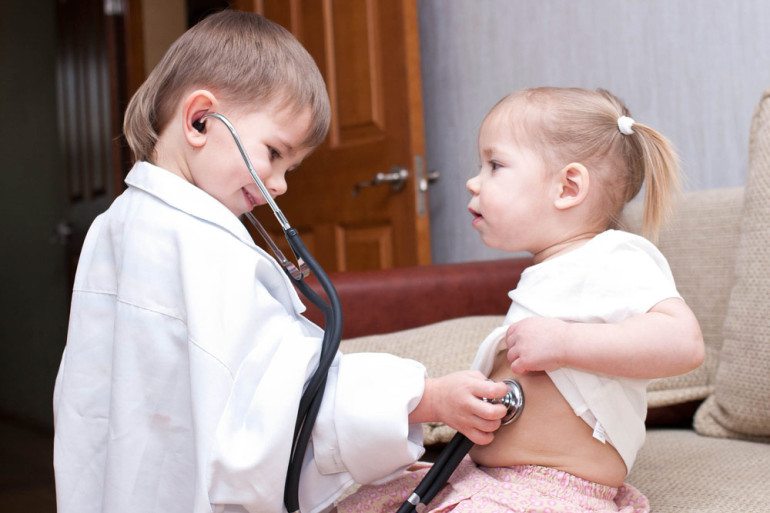Preschoolers Playing Doctor
Tags: body awareness, preschoolers, sex
What do you do when you walk in and find your preschooler prone on the bed, naked, a stuffed animal between her legs and a playmate eagerly looking on?
a) shriek
b) scream
c) both a and b
d) none of the above
Oh horrors, I know… Chances are, the shock will have you doing (c) before your rational brain catches up. It is common for younger children to play with their clothes off. If you come upon a situation like this, try to be calm and smooth and figure out what is happening in their play.
If their imagination play is about doctors and people having babies (hence the stuffed animal between the legs), that’s fine. It may seem weird and sexual to you, but that is not how the children experience that form of play.
The yellow flag you need to watch for is if the children are re-enacting sexual activities or inserting items into each other. These actions are potential indicators of sexual abuse as children often re-enact these experiences in their play.
The other yellow flag is the age difference. Children who are close in age are more likely to be in an egalitarian relationship, but if there is a large age gap, the power imbalance and appropriateness makes this less likely to be about mutual play and discovery.
The best parenting advice I can give is to remember that children need to feel comfortable about their bodies and their budding sexual responses (many toddlers discover masturbation sensations that are pleasant), so stay “body positive” while you enforce the “public” versus “private” aspects of where we choose to expose and touch ourselves. Some educators recommend you just leave the children to play. Some parents feel more comfortable simply asking the children to “change the game, please.” There is no need to report this to the other parent, or stop having play dates with this child.
Most important to me is that both parties are willing playmates. I would make sure that the children know that they need to listen to that “little voice” inside them that may be saying, “No, I don’t like this anymore. Doing this makes me feel awkward and uncomfortable.” When they hear that voice, tell them they need to speak up and say “NO” to either a friend or adult as soon as those “NO feelings” come.



Leave a Reply